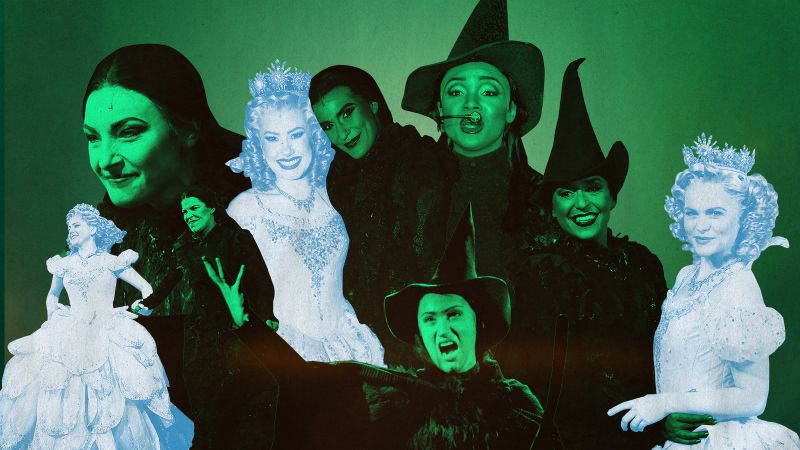The arrival of “Wicked: Part One” in theaters has propelled actresses Cynthia Erivo and Ariana Grande into an elite circle of women who have tackled the dual complexities of musical theater’s iconic roles: Elphaba and Glinda. These characters are not merely performances; they are rich embodiments of a profound story that contrasts foes on the surface yet reveals deep, transformative friendships beneath.
Based on Gregory Maguire’s literary work “Wicked,” this musical loosely interweaves ideas drawn from L. Frank Baum’s beloved “The Wizard of Oz.” At the heart of the narrative is the tumultuous relationship between Elphaba, often portrayed as a misunderstood witch burdened by her green skin, and Glinda, a charming blonde accustomed to privilege. Their character arcs explore the depths of societal prejudices, friendship dynamics, and self-discovery amidst the backdrop of the fantastical land of Oz. The musical narrates their struggles, triumphs, and ultimately, a heart-wrenching yet hilarious journey shared in a bond that is both supportive and adversarial, illustrating the complexities of friendship amidst high stakes.
For over two decades, countless actresses have donned the roles of these witches on different stages worldwide, from Broadway and the West End to touring productions. They each bring their unique flair and interpretation to characters that demand extraordinary vocal prowess and emotional depth. As they navigate the challenging demands of performing multiple shows weekly, they often form a kinship unlike any other. This unique bond among past Elphabas and Glindas provides a support system throughout this demanding period, celebrating the unbreakable connection fostered through shared experiences.
As audiences anticipate the film adaptation of “Wicked,” now a collective 21 years since the Broadway show took its bow, past actresses who have graced the stage find themselves reflecting on their journeys and the profound impact the roles have had on their lives. Their retrospective conversations afford us insights into their evolution and how the witches inform their identities and careers as performers.
Giants of the musical theater world like Jessica Vosk, Eden Espinosa, and Louise Dearman contribute to this narrative. Each actress, from Vosk’s spirited Elphaba to Dearman’s unique experience of playing both Glinda and Elphaba, adds personal touchpoints of growth, challenges, and revelations that come from being part of this beloved production.
The commitment to portraying these witchy personas extends beyond just the performance; these actresses experience personal growth and introspection as they delve into the depths of their characters. Espinosa shares that her formative years while inhabiting Elphaba shaped her adult identity as a woman, emphasizing how performances unfold deeper truths each time. This kind of emotional investment underscores the transformative power of theater, bringing forth the essence of its impact not just on audiences but on performers who resonate deeply with their roles.
Amidst their shared hardships, the actresses also convey the nuts and bolts of their sororal relationships. They reflect on nurturing bonds among one another—an essential tenet embodied in “Wicked.” The camaraderie among witches, both on and off stage, is likened to a “Sisterhood of the Traveling Kermit the Frog Makeup,” illustrating their mutual support system within the demanding theater industry, where competition can often overshadow collaboration.
The emotional toll of their performances can weave difficult narratives of their personal experiences onto the stage, emphasizing resilience and advocacy. For instance, Saycon Sengbloh reflects on how her identity resonated with Elphaba’s message of self-acceptance amid adversity, paralleling her personal journey as a Black woman in the industry.
As these actresses have transcended their own challenges, they also express excitement over the cinematic representation of “Wicked.” They are enthusiastic about the life that the film brings to the narrative—seeing “Wicked” brought to greater life on screen resounds with nostalgia and pride among those who have performed in its ranks. Their reactions—tears of joy and moments of profound reflection—affirm not only their love for the material but the emotional core it continues to resonate.
The witches’ journey, ultimately, comes to symbolize empowerment, resilience, and sisterhood, uniting these actresses through experiences that transcend the stage. They carry the weight of their characters and the bonds formed while performing them—a legacy that continues to thrive in the adaptations, both on stage and screen. Their shared stories of vulnerability, ambition, and sisterly love encapsulate why “Wicked” remains a timeless piece of musical theater, celebrating unique voices while fostering friendships that echo beyond the lights of Broadway.



